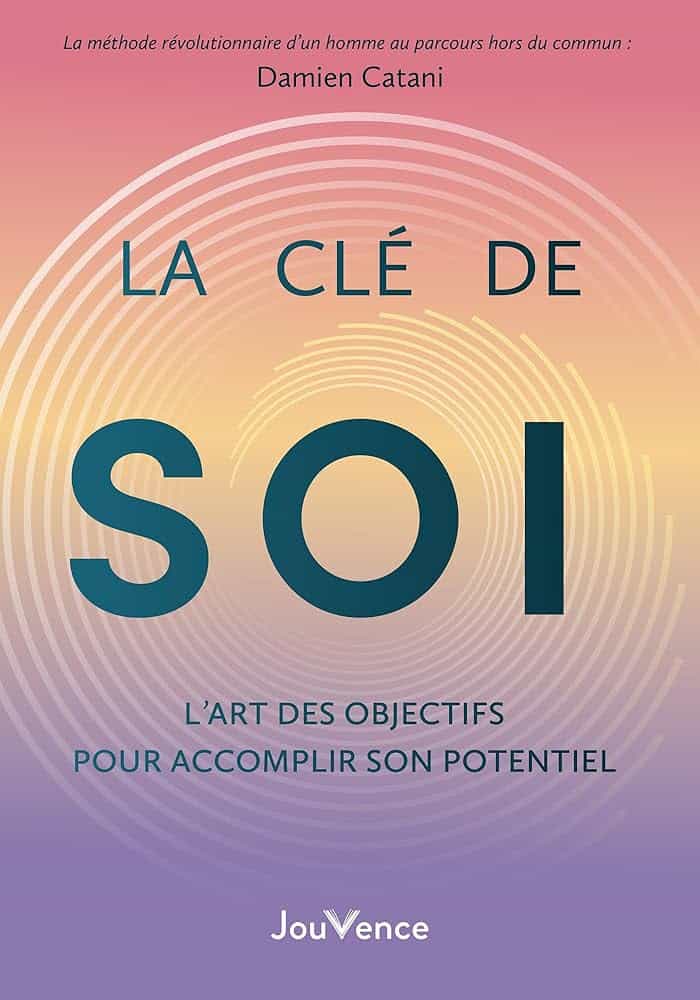In his work The key to yourself at Éditions Jouvence, Damien Catani questions our relationship to goals and self-realization. Between method and philosophy, his approach questions: is personal accomplishment a destination to reach or an infinite quest? And above all, how to overcome obstacles, internal and external, to unlock your potential? Interview.
In your opinion, is fulfilling one’s potential an end goal or an ongoing process? Can we really “reach” our full potential?
Damien Catani: The goals approach is not a linear path with a fixed origin and final destination. Rather, it must be seen as a continuous loop, a perpetual cycle of action and reflection, of shooting and recalibration, which not only pushes us to aim more accurately. But above all to know ourselves more deeply.
At first, the excitement of succeeding, of hitting right in the center of the target, may seem like the ultimate goal. There is an undeniable satisfaction in precision, in achieving the goals we set for ourselves. But as we engage in this dance between action and reflection, a revelation dawns: success is only part of the equation. More deeply, our approach aims to understand the very process by which we aim, to discover how far we can stretch our bowstring, and to recognize the hand that stretches it.
The real goal of the objective approach is therefore not success in itself, but the self-knowledge that it generates. Who are we when we aim? What forces, what desires, what fears guide our hand?
In this continuous loop, each cycle of objectives achieved or missed is an opportunity to learn, about the effectiveness of our strategies, and above all about ourselves. It is in the process of aligning our actions with our deepest aspirations that we discover our true essence. It is an inner journey, an exploration of the soul as much as an external quest.
Is everyone’s potential limited, or can we continually push the boundaries of what we are capable of achieving?
Damien Catani: Only by giving ourselves the chance to try can we explore such a question. Of course, we have physical or biological limits, and I will never run the 100m in 9 seconds. However, when I gain some knowledge of myself through the goals approach, I am able to discern wisely in which areas I can and wish to further push the boundaries of what I have achieved so far. . These areas in which I can still evolve are not the same throughout life. I’ll probably struggle to run the half marathon faster at 60 than I did at 20, but the quality of my writing will probably have improved.
Beyond the particular goals that we set for ourselves, the approach through objectives is a mirror in which we continue to discover ourselves and on this front of self-knowledge, which appears to me to be the ultimate goal. It is possible to always push the boundaries.
Why do you think it is so difficult for many people to set clear goals and stick to them?
Damien Catani: I see two reasons for this. The first is that the introspection work necessary upstream, and which is discussed in the first part of The key to yourself“Tune in,” is not done with sufficient diligence. But it’s about diving deep into yourself to understand your life trajectory, your failures, your successes, your desires and setting yourself goals that really motivate us. The second reason is the lack of a methodological framework. Individuals generally have goals that are not set with enough precision. They do not have a clear approach to tracking their goals over time, measuring progress with appropriate tools, and analyzing the results to continually recalibrate the goals. Which is essential for a goal to stay alive.
What are the most common internal obstacles people encounter when trying to reach their potential (fear of failure, lack of confidence, etc.)? How can we overcome them?
Damien Catani: I have no statistics on the question and will only be able to answer through what I can observe anecdotally around me. Individuals are often unaware of the finiteness of existence and the unique chance they have to explore their potential. We postpone meeting ourselves until later, in a fleeting future. Then, we often believe we lack time for these important things when we waste so much time on futile pursuits.
There is fear too. The fear of really giving ourselves the means to get there and do our best. Because there, in a moment of truth, we will see how far we can go. Perhaps we prefer to delude ourselves by never experiencing who we are. Finally, there is vanity. We often refuse to recognize our mediocrity at the moment, which prevents us from progressing. Reaching our potential involves great humility, and to soar higher, we must know how to recognize where we are starting from.
The obstacles will be different for everyone. Only by setting out can we discover and overcome them.
How to tell the difference between a real limit and a limiting belief that slows down self-fulfillment?
Damien Catani: Is this such an important question? Don’t we only have the limits we give ourselves? Perhaps the only way to answer this question is to get started.
In The key to yourselfis your method based on strict discipline or is there room for flexibility and adaptation over time?

Damien Catani: The methodology that I propose in The key to yourself is well framed, but that does not mean that it is fixed. Adaptability over time is even a fundamental characteristic of the objectives approach. It is not an arrow that we shoot once and for all at a fixed target. We shoot our arrow, we see where it lands. We move the target, we move closer to it, we move away from it, we change arc, etc. The objectives are not set in stone. They are integrated into a feedback loop and are constantly redefined according to the results we achieve.
How can your advice apply to different spheres of life (professional, personal, social)?
Damien Catani: The objectives approach is an “agnostic” approach in the sense that it can be applied indifferently to different spheres of life. Whether they are, for example, sporting, professional or social, the objectives have the same structure. They can be pursued together in a transversal manner with the same methodological framework.
It is even recommended to consider all areas of our life when setting goals. Our time, our energy, our savings, etc.: our aspirations in different areas consume the same limited resources. Taking a holistic perspective on our lives allows for smoother, more balanced navigation, ensuring nothing essential is overlooked, and providing big-picture clarity that increases our effectiveness. The different areas of our lives are interconnected, and success in one can encourage advances in others. Being aware of the frictions or synergies that exist between different fields is essential.
In a global approach, we will undoubtedly give pride of place to healthy living. Whatever our goals and aspirations, it is indeed crucial to keep in mind the importance of sleep, nutrition and physical activity. It would be wise, when we identify our aspirations, to include relevant objectives in these areas. Or at least include them in our field of vigilance.
For someone who feels stuck or failing in an aspect of their life, what would be your first practical tips for initiating positive change?
Damien Catani: I invite everyone to find the answers within themselves, and be wary of ready-made answers as individual situations can vary. This is actually what I am trying to do through The key to yourself. I don’t tell the reader what to do, I don’t hand him a score and invite him to play it. I offer him a music theory so that he can construct it himself.
Personally, when I felt stuck in life, it was by carrying out a deep introspection and starting from the simplest things, in particular physical activity, that I was able to move forward.
What are the mistakes or false ideas that we often have about self-fulfillment?
Damien Catani: Perhaps the most common mistake is viewing self-actualization as a bonus when it is a necessity. Seeking and revealing who we are is the meaning of life. This is not one task among others that we can postpone ad vitam, it is our only truly urgent mission.
Another essential error is to want the end without giving oneself the means, and to look for shortcuts to achieve oneself quickly, without too much effort, when self-realization requires deep commitment. More than a life project, it is a life project.
In a world where “always more” is often valued, how can we find a balance between ambition and serenity?
Damien Catani: Satisfaction does not derive solely from the accumulation of goods or the achievement of goals. Rather, the balance between our aspirations and what we have already accomplished or possessed. Lasting happiness, which comes from a harmony between our desires and our achievements, is often hindered by “ the insatiability of aspiration “. We are constantly looking for more, never taking the time to appreciate what we already have. And at the same time as we achieve some of our goals, we design others, in a never-ending race.
If we define satisfaction as the relationship between what we have and what we desire, it is important not to engage in a headlong rush, with ever new desires. It is therefore a question of pruning and aiming precisely when listing your aspirations, letting go when it makes sense. We can thus set fewer objectives but pursue each of them with more intensity.
To avoid being part of an endless race of permanent acquisition, it is also about working on the harmonious integration of our pursuits, our successes and our failures, within our daily life.








